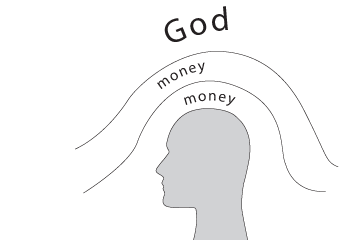Working on your accounts is like fine tuning an engine. If it's done well you can get an awful lot out of it. Life becomes much more satisfying and you have a real peace of mind about what you spend and what you give to God. When every penny is assigned as 'worship', suddenly, every day has a new sense of purpose behind it. A little bit of discipline can really free you up.
On the other hand, if you pay no attention to it, ignore it, bury your head in the sand; all sorts of problems develop. Your finances become wasteful and inefficient. Money is frittered away and you can easily accumulate debt. Your peace of mind goes out the window, your soul feels uneasy.
"A little sleep, a little slumber,
a little folding of the hands to rest-
and poverty will come on you like a bandit
and scarcity like an armed man."
Proverbs 24:33-34
I've heard a lot of sermons on why you should give, but very few on how to give. I thinks there's a general assumption, somewhere along the line, that people actually know how to budget. For years and years I didn't have a clue. It's one of those things that seems obvious when you know how. But if no one has taught you, you're lost at sea. You're stumbling around in the dark.
But one thing that is clear – when you work so hard to earn cash, surely wisdom should govern its distribution. Hard earned cash that is frittered away on things that don't matter is a life consumed with toil, debt and fruitlessness. Effectively managing your accounts is one of the most important elements of your life's work.
At my life group, I plan for us to share effective ideas on how we give to God and manage our accounts. In this, I'm making the assumption that we know why we should give and that we want to be a cheerful give. Here are some of my own techniques I've used in the past, and the ones my wife and I are currently using.
1) Account for every penny.
When I first decided to really tackle my accounts head-on, I decided to write down every penny I spent. To my horror I realised that in that very month I had spent over £300 on socialising and convenience foods. Going out to pubs, eating out, trips to the cinema, drinking Coca-Cola. It honestly didn't feel like I had spent that much. It 'felt' like I had spent about £100. It's easy to forget what you did last week. And it's incredible how expenses add up.
Question: If an accountant was to examine your finances, would he find that Jesus was a priority?
In a lack of discipline I would spend too much on clothes and CDs. And then in a lack of finances I would fail to give God anything. If you're budgeting for the first time, going through the last 6 months of bank statements can be a real eye-opener, and quite painful.
2) Develop a list of averages.
Keep all your receipts and tally up average amounts on a monthly basis. Over the course of a year you can work out average expenses for pretty much everything. Here's a list of what my current averages include:
– Church Giving
– Food
– Clothing
– Socialising
– Rent
– Car Insurance
– Car Maintenance
– Car Servicing
– Car Tax
– Home Insurance
– Home Expenses
– Dentist
– Glasses
– Gym
– Car & Bike Repayments
– Life Insurance
– Mobile Phone
– Sky
– TV license
– Card Protection
– Holidays & Special Events
– Weddings
– Stag Do's
– Haircuts / Beauty
– Presents
– General savings
Developing this list helps you learn exactly what you need to budget each month and pay into savings. In particular, you need to work out all the seemingly random and unexpected expenses (such as weddings and stag-do's). Otherwise, you get caught out.
In this, highlight all the items on the list that you would regard as 'worship' to God. Interestingly, most of the items are necessary in life (most, not all!). And a lot have a question mark over them. These are the open-ended ones, such as food, clothing, socialising, holidays, presents, phone tariff and type of vehicle. They can all be governed with wisdom and diligence, or they can be self indulgent and reckless. These will make or brake the bank.
"So whether you eat or drink or whatever you do,
do it all for the glory of God."
1 Corinthians 10:31
3) Determine the open-ended expenses.
– Food
– Clothing
– Convenience foods
– Socialising
– Presents
– Random purchases
These are the day-to-day expenses that can go off the scale if left unchecked. The most effective way that Lynsey and I have dealt with this is to have a weekly cash allowance. We worked out that we get £25 each per week, and out of that we have to cover all of the above. All birthday, Christmas, wedding presents, clothes etc come out of this. We have to save up in advance for lots of these.
We've found it to be a brilliant method as when the money in your wallet is gone, that's it for the week. You know you won't go over budget. And anything you buy, you know you can afford and you feel good!
4) Keep on top of it.
It only takes 30 minutes every week or so. Regular updates to your charts means you can remember what the expenditures on your bank statements relate to. Constantly updating your averages and budget keeps things in check. Apparently the very act of keeping accounts improves your spending, as you're mindful of your finances.
5) Find peace about your church giving.
It's not about 10%, it's about generosity. There's nothing in the New Testament about giving 10%. In reality, when you study the early church, they all appear to give much more than this. Old Testament tithing was effectively the Jewish taxation system, and was actually about 25% of their total income per year. The 10% figure is just a reference to the largest part.
"Each man should give what he has decided in his heart to give, not reluctantly or under compulsion, for God loves a cheerful giver."
2 Corinthians 9:7
Would you ever want a present off a friend who gave it reluctantly because they felt they had to? You would probably feel awkward, and wish they hadn't felt obliged. In stark contrast, how much would you love to get a gift from a friend who was really excited to give it to you, and couldn't wait to see the look on your face! You would love it.
I think each one of us has to find the right level of giving and the right heart that produces this excited attitude. In one sense, the cost has to be there. The gift has to be worth something to us to contain meaning; but not to the level that it breaks the bank and causes us to freak out.
What feels too low? What feels too high? I think you can home-in on a figure that your heart really feels at peace with, that makes your faith muscles stretch but not tear.
Any thoughts?




